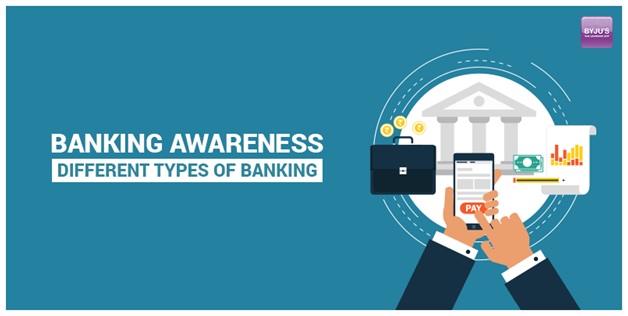Banking awareness is one of the most important section for the aspirants who wants to clear bank exams. In this exam, each section comprises of sectional cutoff along with the overall cutoff which the candidate needs to clear in order to qualify.
The banking awareness section is a part of general knowledge where a maximum of the questions come from this section in written and interview. The candidate needs to be well aware of these questions to score decent marks.
The different types of banking and the key points are described below:
- Commercial Banks: these banks are responsible for short-term loans to the traders and businessman. The banks which allow to deposit and withdraw money for investment matter. The medium-term and long-term lending is not supported in commercial banks.
- Industrial Banks: the medium and long term lending is supported by Industrial Banks.It accepts long-term deposits. The industrialists apply for long-term loans for their commercial use. Industrial banks help in providing debentures and shares as well as selling purpose.
- Agricultural Banks: these banks provide loans for agricultural purpose. They give both short-term as well as long-term credits, short-term credit for buying fertilizers or other requirements and long-term credits for purchasing equipment, land for agricultural use.
- Exchange Banks: these banks help the businessman in their import-export trading system. Exchange banks are mainly responsible for the foreign transactions. They accept, discount and collect the bills for exchange.
- Saving Banks: this banks mainly help the people to deposit money for their further requirement. The middle-class people, as well as the below-privileged community in the society, are encouraged to save money.
- Central Bank: this bank controls, supervises and regulates the monetary system of the country. It is the single system which issues notes. Apart from being the banker, it supervises the other banks and acts as a lender. The international currency is mainly exchanged here and the credit is controlled by the central banks.
There are few key points which are essential to know for the upcoming bank exams other than these types:
- Para Banking: the banking activities other than withdrawal and deposits and these activities are managed either by individual department or subsidiaries.
- Narrow Banking: the investment is done with security. The government bonds assist the people here in investment. This is done to avoid risks and banks involved in these are known as narrow banks.
- Offshore Banking: the abroad currencies are accepted by this banks. The legal and financial benefits are provided by offshore banking. When the money requirement is more than other banks the people go for this type of banking.
- Green Banking: this laid its emphasis on eco-friendly environment which aims to reduce the use of carbon footprint in the daily banking activities. This promotes greenery and reduces the cost of renewable banking sources.
- Retail Banking: this is made for the general public where direct contact is done with the retail customers. It is also done as consumer or personal banking.
- Wholesale Banking: the services offered by the banks to investors, corporate clients, institutional customers, financial institutions or even mortgage brokers.
- Universal Banking: R H Khan initiated this where all the financial activities as per laws and government rules are carried out. They include activities like credit cards issue, foreign exchange options, merchant banking, etc.
- Islamic Banking: this type of banking follows Islamic rules. They are very stern in implementing things in favor of Islam community. Sharia Compliant Finance is also a term used for Islamic Banking.
- Unit Banking: it was initiated in the USA where a single branch performs all kinds of operations. The customer who has an account in a single branch has to go through all the activities of that specified branch only. Local Area Banks and Regional Rural Banks are examples of Unit Banking.
- Mixed Banking: here the deposit and investment take place at a time. This can also be called as the dual functioning of commercial and investment banking.
- Chain Banking: 3 banks are grouped together to carry out the various banking activities. The bank has their own independent functions. The revenue is more in this case where the activities are performed individually.
- Relationship Banking: the basic needs of the customers are understood and accordingly the bank provides services. The banks gain every detail of the customers and get to know the significance of a credit.
- Correspondent Banking: this is a business oriented bank located across 200 countries where there are no restrictions as the banks are not present physically to perform the operations. This also can be called as banking agent.
The IBPS 2017 exam will consist of banking awareness which will include questions from this key point so these are important for the aspirants. The candidates are to be well versed in the types of banking.


Post a Comment